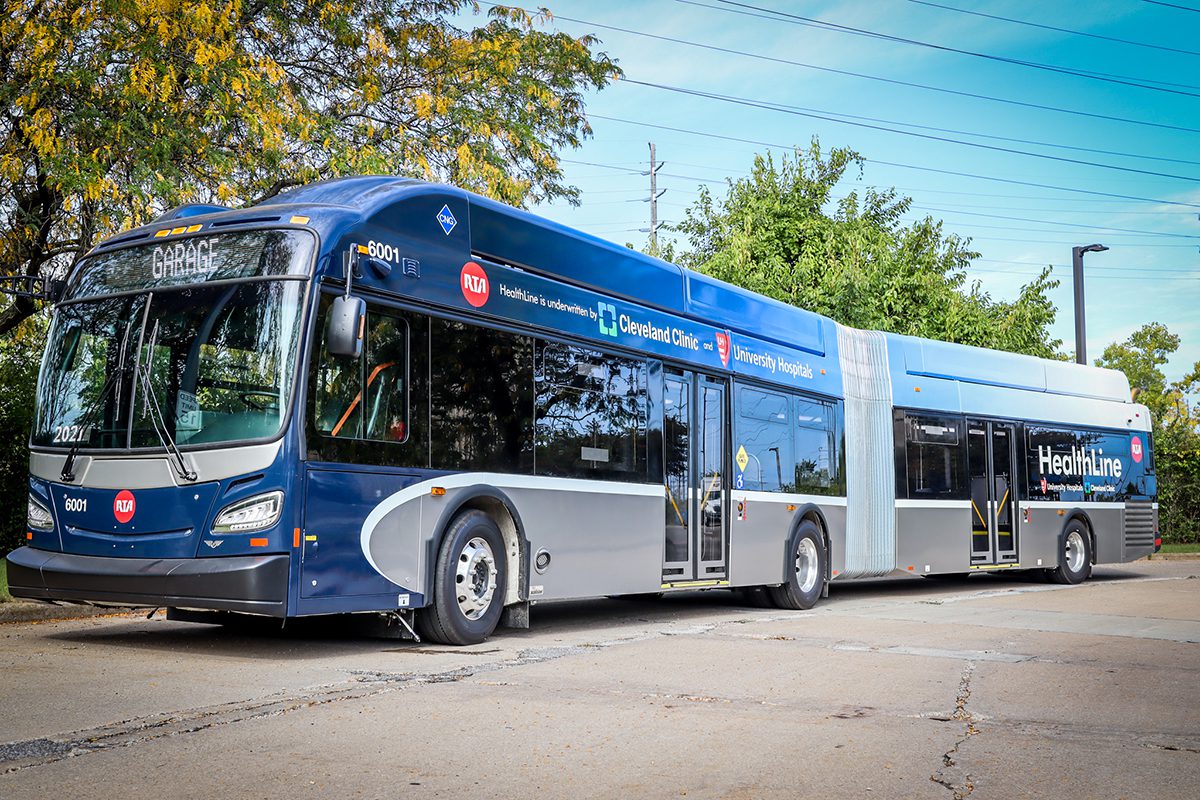In partnership with:

The Greater Cleveland Regional Transit Authority (GCRTA) began its investment in natural gas vehicles in March of 2015 motivated by both the financial and environmental advantages of operating a near-zero emissions natural gas fleet. With a large and growing fleet of CNG buses, GCRTA worked with their long-time fueling vendor, Trillium, to upgrade its fueling facilities in order to accommodate its expanding fleet which includes 16 new 60-foot CNG-powered buses that are part of its HealthLine fleet. The HealthLine fleet is Cleveland’s first Bus Rapid Transit (BRT) system which has been recognized for having the best return on investment for a transit project, regardless of mode, in the country.
Low carbon natural gas is a clean-burning alternative fuel, producing up to 27% fewer carbon emissions than diesel, while providing safe and reliable technology that can perform on par with diesel technology. GCRTA is working to increase its sustainability efforts and is focused on the environmental benefits of near-zero emission natural gas vehicles including a 30% reduction of greenhouse gases and 85% reduction of nitrous oxide emissions—the emissions that most immediately impact human health.
Low carbon natural gas is a clean-burning alternative fuel, producing up to 27% fewer carbon emissions than diesel.
After an initial purchase of 60 40-foot CNG-powered buses in 2015, an additional 104 CNG-powered buses were ordered over the next three years. With a CNG fleet of 180 buses in total (including the 16 new buses), GCRTA turned to Trillium to build CNG dispensing facilities at its two bus garages to service its growing CNG fleet.
Trillium, a leading provider of renewable fuels and alternative and innovative energy solutions for fleets, helped to design, build, and maintain GCRTA’s CNG stations beginning in 2014. As GCRTA’s investment in CNG increased, the transit turned to Trillium again for an upgrade at the Hayden Garage. GCRTA selected Trillium as the CNG vendor following a competitive “request for proposals” process.
Beyond fuel savings, natural gas buses are similar to diesel vehicles in terms of operational performance.
“We have seen the cost effectiveness and environmental benefits of our CNG buses and have been impressed with the success of the 40-foot CNG-powered buses in our fleet, said Nicholas Biggar, Hayden District Director. “As we continue to update our fleet and replace our diesel-fueled buses with new and larger CNG buses, we appreciate the knowledge and guidance from Trillium to ensure that our garage is fully equipped to refuel these buses and get them back on the road, allowing us to continue providing excellent service to our community.”
With a potential fuel savings of more than $200,000 over the lifetime of each vehicle, using today’s diesel and CNG prices, natural gas buses can also provide substantial fuel savings. Beyond fuel savings, natural gas buses are similar to diesel vehicles in terms of operational performance — with no compromise on power, acceleration, range, or cruising speed.
Trillium designed and built GCRTA’s first CNG station at the eastside Hayden Garage which has been refueling CNG buses since 2015. The authority is building a second CNG station housed in the Triskett District Garage which will fuel buses that will serve westside Cleveland residents. Construction of the Triskett District station will be completed this year and will have the capacity to fuel more than 100 CNG buses.
“Trillium has a long history of championing alternative fuel solutions in Ohio including supporting the continued growth of CNG infrastructure and vehicle deployments throughout the state,” said Ryan Erickson, vice president of Trillium. “I’m pleased to see our relationship with GCRTA flourish, as we continue to provide air quality and sustainability benefits to Cleveland’s residents.”


